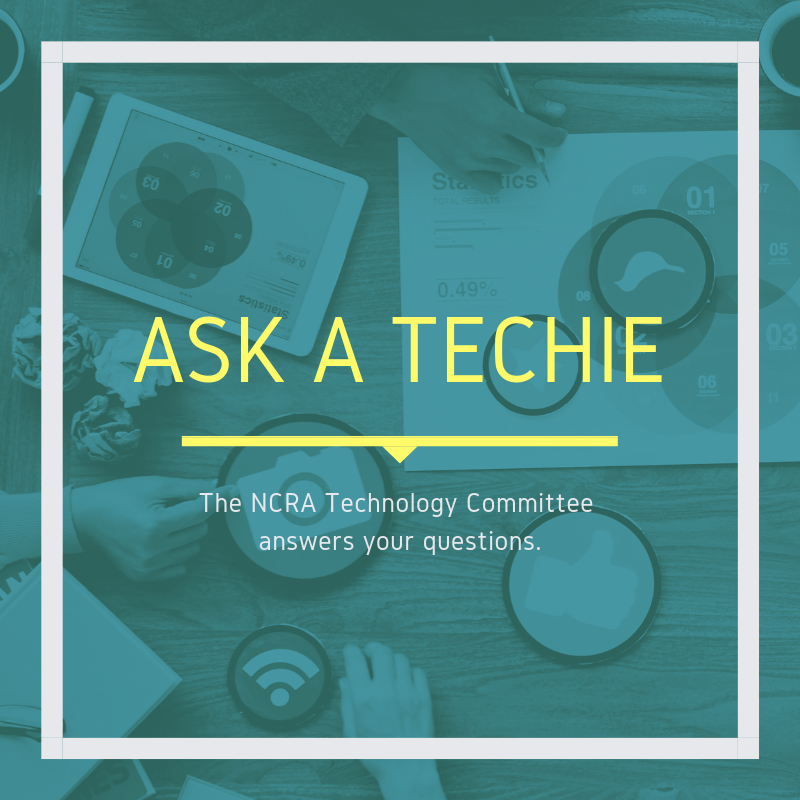Dear Techie:

I’ve heard so much lately that court reporters need to write shorter to keep up with the fast talkers and to save stress on their hands. I’d like to see if the Tech Committee members have some good one-stroker briefs for some common phrases that come up during depositions on a regular basis.
Short ’n’ Sweet
Dear Short ’n’ Sweet,
Yes, the members of the committee feel strongly on writing short. So great question! Below are a few suggestions for briefs for phrases to get you started.
Happy briefing!
Alan Peacock, FAPR, RDR, CRR, CRC
I find myself phrasing more and more lately. I use the following left-hand phrase starters (LHPS) and then add my right-hand phrase enders (RHPE). For example LPHS: YO is I don’t. And RHPE “N” is know. So YON is I don’t know.
Here are some others: LHPS: GOI for going to; TRAO for try to; GRAO for trying to; DRAO for tried to; KB for because; BH for but. I have many others, but these are the ones that come up for me every day.
And then using your RHPEs, there are countless combinations that can help you write phrases quickly and accurately!
Another trick I use is to use the asterisk to reverse the word order. For example, I would write the phrase Would I say as WOIS. But if I throw in the asterisk (WO*IS), it’s I would say. You can use that for all phrases. It comes in handy!
Kim Greiner, RMR, CRR, CRC, RDR
G-GT – going to
GAOBT – going to be
GAOUF – going to have
GAOUFT – going to have to
GAOUFD – going to have to do
TE*M – tell me
HE*M – help me
LE*M – let me
LE*MD – let me hand
1-RZ – 1st
2-ND – 2nd
3-RD – 3rd
and so on.
2IRZ – 21st
and so on.
1OI – 1.<delete space>
2OI – 2.<delete space>
and so on.
1* – 11th
12* – 12th
13* – 13th
and so on.
I use Catalyst Accelerwriter with an interrupted speaker macro: My stroke is R*P, which inserts the dashes for an interrupted question, answer, or colloquy.
Lynette Mueller, RDR, CRR, FAPR
My realtime goal is to always strive for 99.8 percent translation rate on every job. The prep work is essential to maintain or exceed that goal. My writing is constantly evolving. Writing short is paramount to the success of my translation rate, for keeping up with the fast talkers and, also, being kind to my body — specifically my back and hands.
LEM – let me
LOEM – let me know
PLOEM – please let me know
WLOEM – would you let me know
KLOEM – can you let me know
SLOEM – so let me know
GOI – going to
GOIB – going to be
GOIG – going to go
GOIGT – going to get
GOIM – going to make
GOIRM – going to mark
GOID – going to do
LU – will you
LUB – will you be
LUFL – will you feel
LUF – will you have
LUNT – will you not
LUP – will you please
LUPT – will you point
LUS – will you say
LUT – will you tell
LUTS – will you tell us
Lisa Knight, FAPR. RDR, CRR
So many briefs, so little time. Even after 35 years, I’m still trying to improve my writing! When I write shorter, I am less fatigued! Who doesn’t want that?
SWUD – as you sit here today
SWED – as we sit here today
SHERD – sitting here today



